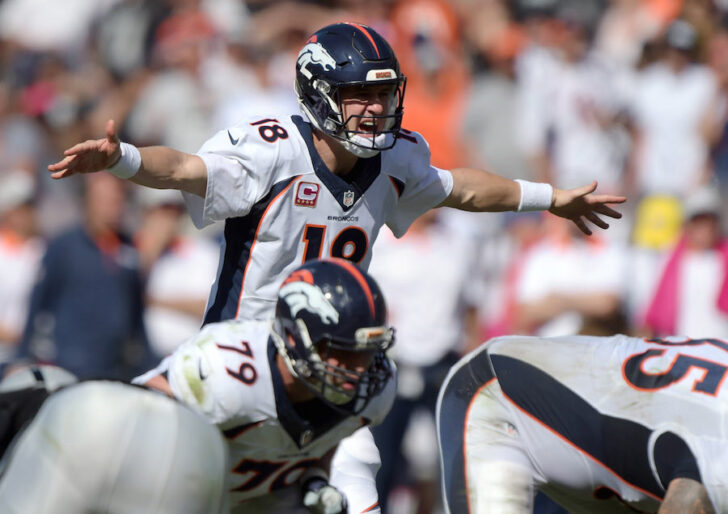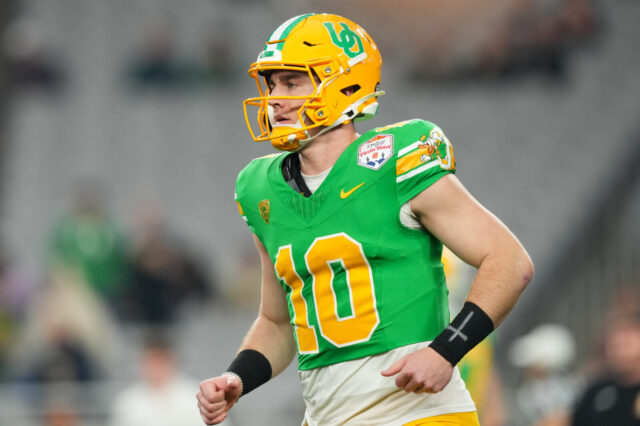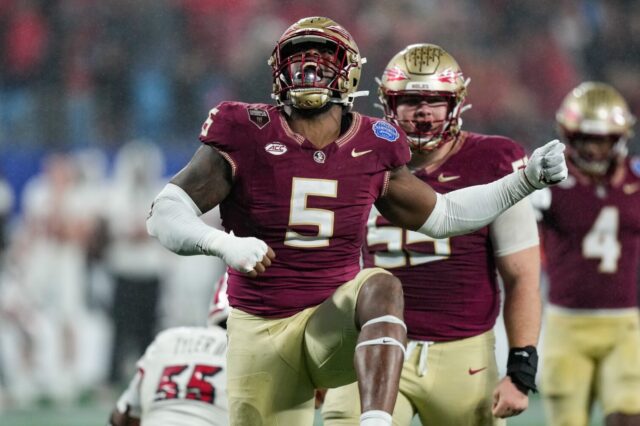As of this morning, there are six undefeated teams remaining in the NFL. The fan bases for five of those teams are planning parade routes, thinking about the best places to erect statues and wondering which three stars will be featured on their edition of “America’s Game.” And the other one is feeling uneasy.
All is well in Cincinnati, where the Bengals overcame a 17-point deficit at home yesterday to beat the Seahawks. Everything is great in Green Bay, as the Packers survived two interceptions by Aaron Rodgers to knock off a stubborn Rams team at Lambeau Field. And things are great in Atlanta, on the heels of an overtime win over a Redskins team that was pesky at the Georgia Dome.
Those three teams all sit at a comfy 5-0 today.
Meanwhile, the Patriots continue to roll along, still on track for a monster season after dismantling a depleted Cowboys team in Dallas. And the Panthers sat at home yesterday, basking in the glow of a perfect record during their bye week.
Those two teams are 4-0 at the quarter point of their seasons.
But in Denver, there is no such joy. In the Mile High City, an undefeated team is causing angst; it’s stirring debate amongst fans, media members and perhaps even people within the organization. A sputtering offense has normally sane people actually wondering if a guy who has thrown 30 career passes isn’t a better option than a future Hall of Famer.
Instead of hitting the panic button, however, they should let history provide the answer as to what is wrong with a once-powerful attack. Looking back in time will explain why things aren’t currently working for the orange and blue.
When the Broncos were winning back-to-back Super Bowls, they were loaded with talent at the skill positions, boasting a roster that featured the likes of John Elway, Terrell Davis, Shannon Sharpe, Ed McCaffrey and Rod Smith. They were unbelievable playmakers, guys who stole the show and earned the headlines.
But ultimately, they weren’t what made the 1997 and ’98 teams tick. Instead, it was the unsung heroes in the trenches that allowed Denver to capture two straight championships.
The Broncos offensive line allowed Elway to sling passes all over the field and opened gaping holes for Davis to run through. They were so good that the team didn’t miss a beat when Bubby Brister was forced to start four games in 1998 or when a journeyman running back line Derek Loville spelled TD late in games.
And this dominance didn’t occur by accident. Knowing that he had an aging quarterback, head coach Mike Shanahan went about assembling a stalwart offensive line that could protect Elway; the Broncos spared no expense and left no stone unturned when looking for the right mix in the trenches.
Through trades and free agency, Denver brought in Gary Zimmerman, Harry Swayne and Tony Jones to play tackle, while also adding Brian Habib and Mark Schlereth at guard. They teamed with center Tom Nalen to form a formidable group, one that could execute Shanahan’s offense to perfection.
Fast forward nearly 20 years and the Broncos are trying to use the same system to win a championship with an aging quarterback, but they’ve taken a vastly different approach to building their offensive line. In fact, it’s as close to 180 degrees in the other direction that they could possibly be.
Yesterday, Peyton Manning lined up behind a group that at various times featured a tackle who hadn’t played an NFL snap prior to last week, two others who were added to the roster as street free agents (one as recently as last week), a center who was playing in his fifth NFL game and a guard who has been in Denver for a grand total of six weeks. If not for Louis Vasquez, an All-Pro right guard, the Broncos offensive line would be nothing more than a hodgepodge of 300 pounders.
Yet somehow, the powers that be at Dove Valley expected this group of newbies to succeed in 2015. Totally lacking in experience and having never played together, they were supposed to gel into a viable front five in front of a 39-year-old quarterback.
It’s a baffling plan, one that is made even harder to understand given that it’s architect is the very man who benefitted in 1997 and ’98 from playing behind a dominant offensive line that featured a future Hall of Famer, a future Ring of Famer and years of NFL experience. But instead of learning from that success, John Elway instead decided to take the complete opposite approach.
The result is an offense that can’t consistently put points on the scoreboard, despite the presence of great skill-position players. This was never more evident than when Denver’s high-powered attack managed a paltry nine points in Oakland.
But this result shouldn’t be shocking. In fact, everyone with access to a roster and a depth chart could have seen it coming throughout the offseason. On paper, the Broncos offensive line always looked shaky. When Ryan Clady was lost for the season in late-May, the group became downright scary.
Yet throughout OTAs and most of training camp, Elway did nothing to address the situation. He insisted that two rookies (Ty Sambrailo and Max Garcia), three players with zero career snaps in the NFL (Matt Paradis, Ben Garland and Michael Schofield) and three scrapheap veterans (Ryan Harris, Gino Gradkowski and Shelley Smith) could combine with Vasquez to somehow form a respectable o-line.
It was a ridiculous notion, one that was apparent on an almost daily basis during training camp, when the Broncos defense continually mauled the offense. But the situation wasn’t addressed at all until Denver signed Evan Mathis on Aug. 25, a move that came so late in the preseason that the Pro Bowl guard’s first live action was in the season opener.
Five weeks into the season, the o-line is still a mess, with injuries working even more inexperienced players into the mix. And it’s causing the Broncos woes on offense.
Denver can’t run the ball at all. On Sunday, they amassed a grand total of 43 yards on 18 rushes, a paltry 2.4 yards per carry. That’s not getting it done, in any way shape or form.
To be fair, C.J. Anderson and Ronnie Hillman aren’t blameless. They’re running backs that can’t make anyone miss, the key trait possessed by those who can turn two-yard runs into long gains.
That said, they haven’t had a lot of help up front. The Broncos patchwork offensive line isn’t opening up many holes, providing very few running lanes for Hillman, Anderson or whoever else has the unenviable assignment of taking handoffs from Manning.
This inability to run the football is allowing opposing defenses to tee off on the Broncos passing game. They bring pressure from all angles and press the receivers, knowing that they don’t have to respect the ground attack and Manning won’t have enough time to beat them down the field; this is a formula that dates back to the second half of last season, when Denver juggled their offensive line in a desperate attempt to improve up front.
As a result, No. 18 has to get rid of the ball in a hurry. In order to do so, he has to decide where he’s going with the football before the play starts; his pre-snap reads are almost always determining where he’s going to throw.
More often that not, the über-prepared Manning makes the right decision in those instances. But sometimes, such as on the interception he threw in the end zone prior to halftime against the Raiders, he misreads the play; the result was a pass into triple coverage that never had a chance of being completed.
Those are the plays that have killed drives. Moments like that are the main reasons why the Broncos haven’t been putting points on the board.
On Sunday, Denver’s offense was decent statistically, outgaining the Raiders despite running 13 fewer snaps. But their o-line deficiencies continually reared their ugly head, resulting in negative plays that made others look bad and ultimately ended scoring chances.
If the Broncos offense is going to improve, they don’t need their quarterback to find the fountain of youth, receivers to hang onto footballs or running backs to suddenly become more elusive. They need their offensive line to start playing at a higher level.
Peyton Manning has covered for them through five games, taking the lumps physically (he’s been hit a lot) and emotionally (he’s getting most of the blame for Denver’s offensive woes), but that can’t continue forever. In order for the Broncos to feel as good about their unbeaten record as the other five teams with a perfect mark, they need to get much better in the trenches.
If they don’t, a potentially great season will have gone up in smoke because John Elway failed to remember Broncos history.



